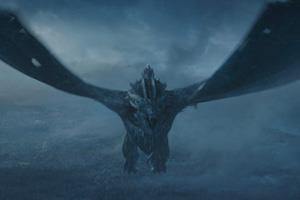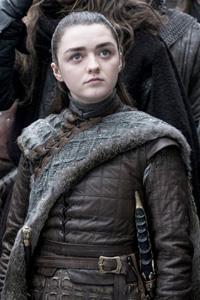How little we knew.
Much has been written and said about these final six episodes of Game of Thrones which begin Sunday (April 14 on HBO). Speculation about how Thrones will end has been fevered and dramatic, and will only become more fevered and dramatic as it nears its final appointment with destiny on May 19. Now-familiar faces like Emilia Clarke (top), John Bradley, Conleth Hill, and Kit Harington (top) have made the rounds on the late-night talks shows and comedy programs — Saturday Night Live, The Late Show with Stephen Colbert, etc. — only to say, no, they won’t tell, they’re sworn to secrecy and, let’s face it, you probably wouldn’t want to know until you’ve seen it for yourself. The truth is that the mystery is almost always more fun than the final reveal. Just look at the way Lost ended in 2010. Lost never really improved on its bravura, inspired first season — how could it?

One of the many truly remarkable things about Game of Thrones – and it is remarkable – is how it took an engaging first season and built on it from there. It’s not often that a popular series can be said to improve over time, but that’s exactly what Game of Thrones did. All credit to David Benioff and D.B. Weiss — and HBO — who took novelist George R.R. Martin’s original source material and turned it into something elegant and beautiful and magisterial, on a scale never before seen on the small screen.
When it ends in May, Game of Thrones will have aired just 73 episodes over eight seasons. It won’t end anywhere near the century mark in terms of episodes made — The Simpsons, in contrast, aired has aired more than 650 episodes — but there can be little doubting the way Game of Thrones changed the medium of television in its own way.
It’s moments like this when it can be instructive — eye-opening, even — to go back to the very beginning, when Game of Thrones was brand new, with just one actor of any prominence, Sean Bean, and a largely unknown, yet-to-be-discovered cast of supporting players.
On a bright, wintery afternoon — appropriate for the season — in January 2011, cast members Sean Bean, Peter Dinklage, and Emilia Clarke joined George R.R. Martin, David Benioff and D.B. Weiss for Game of Thrones’ first and only, as it would turn out, press conference before the Television Critics Association.
At the time, despite the novels’ cult following, and despite the massive sums of money rumored to be lavished on Game of Thrones’ production budget, few in the room believed Thrones could possibly live up to the critical attention and social-media buzz that surrounded The Sopranos, which had retired little more than three years earlier.
HBO was desperate for a series hit that would be both a water-cooler talking point — back in a day when there were water coolers — and a popular and financial success, one that would replace The Sopranos in the pantheon of seminal, ground-breaking television dramas. An expensive sword-n-sorcery epic based on a series of books that only fanboys and fangirls had heard of hardly seemed the ticket, but to their credit HBO decision makers rolled the dice on a bet that, looking back on it today, must have seemed crazy at the time.
Remarkably, aside from an episode of the British medical soap opera Doctors, and a brief appearance in the made-for-TV movie Triassic Attack (don’t bother), Game of Thrones was Clarke’s first on-camera role. The London-born Clarke, whose father was a theater sound engineer from the British Midlands city of Wolverhampton, had only a handful of theater roles to her name. She was 24 at the time. Her Game of Thrones character, Daenerys Stormborn, “Mother of Dragons,” seemed like a distant, barely formed thought in her mind at that point.
“Obviously, that’s the dream,” she said softly at the time, after landing a key ensemble role in an HBO epic few knew anything about, except that it was costing HBO a lot of money.
“I never thought it would actually happen, though. I never thought I would actually be here, so relatively inexperienced, so it’s a blessing. It’s incredible.”
She had no idea.
This past weekend, when Clarke made an unexpected appearance during Kit Harington’s opening monologue on Saturday Night Live, the studio audience went mental.
Daenerys, of the House Targaryen, “First of Her Name, the Unburnt, Queen of the Andals and the First Men, Khaleesi of the Great Grass Sea and Breaker of Chains,” is now a household name.
Martin, the career novelist who created this world, had a hunch at the time, even if others — myself, for example — didn’t.
“Fantasy and science-fiction fans are very intense,” he said, with droll understatement. “They love their favorites with a great deal of passion. I think part of it is the fact that there’s relatively little of it out there. I mean, television is full of lawyer shows and medical shows and situation comedies, but fantasy shows . . . (not so much). Fantasy is something that has been restricted to books for a long time, and the readers of those books have their favorites. Some of them are readers of my books. And they’re really hungry to see some good fantasy brought to television.”
David Benioff, who along with D.B. Weiss is the de facto godfather behind Game of Thrones — with veto power over even Martin, if House Stark push comes to House Lannister shove — said Martin was being too modest.
“It’s not the genre people are so obsessed with. It’s George’s books in particular. I got an email a couple of weeks ago. I met someone after a wedding recently, and I told him I was working on the show. He sent me this two-page email about how excited he was. It (was) the dean of Stanford Law School. He is completely obsessed with George’s books. There’s something about them that even people who aren’t normally into fantasy find themselves drawn to. My 72-year-old father started reading the books, because I was working on the series, and is now a complete addict. George’s characters don’t feel like they come from a fantasy series in that they feel like human beings. It’s not just the epic battle of good versus evil. These are characters of enormous complexity and shades of gray. There is a hunger for that, and not just on the screen. To come across something that treats (the subject) with as much sensitivity and intelligence as George does — it generates enormous passion from the fans.”
Game of Thrones was hardly the first television drama to tackle fantasy. The only successful ones prior to Thrones were high camp, like Xena: Warrior Princess. Barely anyone remembers the short-lived summer series Roar, for example, which was filmed in New Zealand and aired just eight of 13 episodes in the summer of 1997 on the Fox network. It starred a young, then-unknown Heath Ledger, but even that was not enough to draw much interest.
“I can’t speak to why other series haven’t worked,” Benioff said back in 2011 before a single episode of Game of Thrones had aired. “One incredible luxury that Dan and I have had working on this is that we’re not making it up as we go along. We’re going into it knowing that we have an incredibly well mapped out, well-plotted storyline that’s going to continue, if we’re lucky, season after season.
“George has already done so much of the work for us. We have characters and storylines that continue for years. To be able to build into the first scene things that are going to happen in, say, the third season gives us an incredible amount of freedom. It’s just a major, huge canvas on which to paint.”
If the intervening eight years have proven anything, it’s that luck — “if we’re lucky,” Benioff had said — had nothing to do with it. Game of Thrones struck a popular nerve almost from the moment it aired.
“I’ve read the first one, and I loved it,” Peter Dinklage — Tyrion Lannister, aka “the Imp” in the series — said at the time. “That was one of the reasons I signed on for the show.”
As well he might. Dinklage could hardly have known it at the time, of course, but he would go on to win three Emmy Awards from seven nominations — in 2011, 2015 and 2018. A fourth, this year, would not be out of the question.
When HBO first announced Game of Thrones, Benioff was quoted as saying it would be “The Sopranos meets Middle Earth.”
“Ugh!” Benioff said. “Did I say that? Yes. I think that’s from four years ago, and I kind of wish I hadn’t ever said that. One of the things we did — and Dan (Weiss) was talking about this just yesterday — was recognize how HBO explores genres, whether it’s gangsters or westerns or the cop drama. One of the things that always intrigued us about doing this at HBO — and HBO was really the only place we could imagine doing it — was that you could actually lavish time on these characters, and do it with the darkness that the story requires. George’s fantasy is not a for-children fantasy. It’s sexy, and it’s violent, and it’s brutal, and none of the characters are safe. Truly, none of the characters. Characters that you think are going to go on for six seasons meet an early end. Of all those shows that have done that kind of putting-the-character-in-jeopardy drama, who has done it best? It’s been HBO in The Sopranos. One of the things that was so exciting about tuning into The Sopranos or The Wire was that you never knew who was going to get whacked. We’re not a gangster show, but (Game of Thrones) has elements of that.”

Even in 2011, Benioff allowed that one of the things Game of Thrones’ success — or failure — hinged on was its child actors, all unknowns: Sophie Turner, Maisie Williams (left), Isaac Hempstead Wright, even the young looking, preternaturally gifted Clarke.
“Our wonderful casting director, Nina Gold, managed to find these kids who, as George said, hadn’t worked before,” Benioff recalled. “She plucked them from some strawberry field somewhere, and they’re just remarkable. The fact that they were able to perform as well as they did, with no experience, and the fact that Emilia, who has such an incredibly huge role, came in with that much pressure, big sets with lots of extras and a lot of lights shining down on her — I never saw any fear.”
It was an omen of things to come.
“I was hiding it really well,” Clarke admitted. “As the audition process went on and on, the gravity of it kind of hit home a little bit more, how huge this character really was. . . The screen test was scary. The last audition I did was really, yeah, quite frightening, but incredible at the same time. Everyone was so nice, so it was really difficult to be intimidated in any way, apart from just how many people there were. But that’s like, right now.”
That was then, and this is right now. Spring is coming, and with it, Game of Thrones’ final grace note.